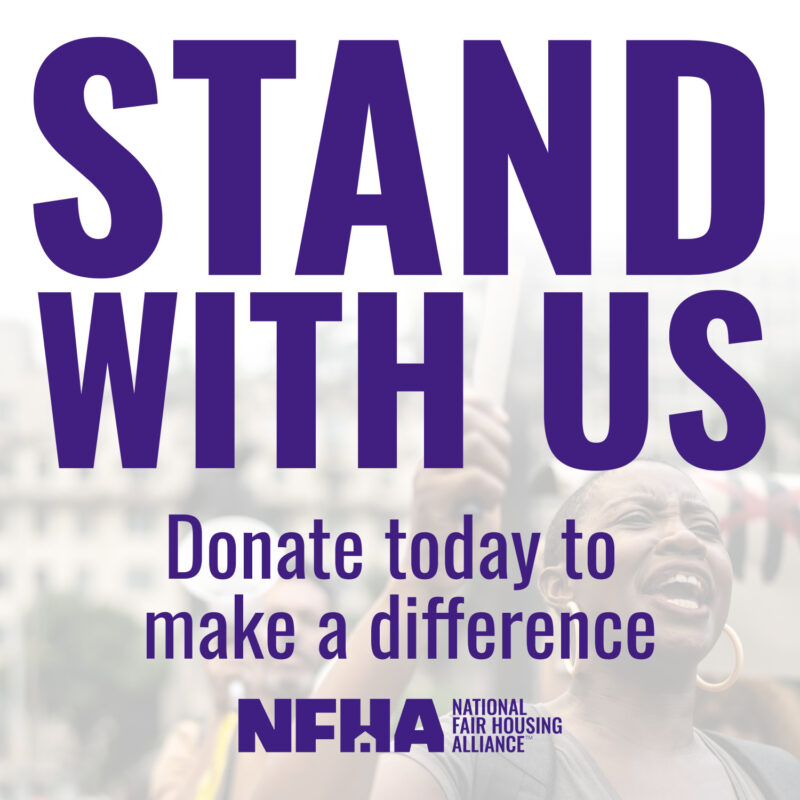The Trump Administration’s FY26 Budget Will Worsen the Fair and Affordable Housing Crisis
FOR IMMEDIATE RELEASE:
The Trump Administration’s FY26 Budget Will Worsen
the Fair and Affordable Housing Crisis
Washington, D.C. – Today, the National Fair Housing Alliance® (NFHA™) submitted a letter to the U.S. Department of Housing and Urban Development (HUD) Secretary Scott Turner to correct the record regarding the justification for cuts to HUD’s fair housing programs and urging him to advocate for critically necessary and more responsible funding levels. The Trump Administration justified these cuts based on erroneous information. The administration falsely claimed that state and local enforcement agencies funded by HUD’s Fair Housing Assistance Program (FHAP) processed about 75 percent of the nation’s fair housing complaints. In fact, research shows that local nonprofit fair housing organizations funded by HUD’s Fair Housing Initiatives Program (FHIP) actually processed 75 percent of all housing discrimination complaints filed as compared to only 19 percent processed by FHAP agencies, 5 percent processed by HUD, and 0.12 percent processed by the U.S. Department of Justice. So, in reality, FHIP-funded local fair housing organizations process more than 2.5 times as many complaints as all of the government agencies combined.
Despite the nation’s escalating fair and affordable housing crisis, the administration’s FY26 budget proposes drastic and unjustified cuts. If passed, this budget would result in:
- eliminating the local Fair Housing Initiatives Program (FHIP), which was created under the Reagan administration and funds cost-effective, local nonprofits that ensure access to housing opportunity free of discrimination for seniors, disabled veterans, people with disabilities, people of color, families with children, women, people of faith, and more;
- allocating only $26 million for the state/local Fair Housing Assistance Program (FHAP) with no new money to make up for cutting other fair housing programs and failing to recognize that 12 states and many localities do not have FHAP-funded agencies to assist victims of housing discrimination; and
- allocating only $55 million for HUD’s Office of Fair Housing and Equal Opportunity (FHEO), which cuts $31 million from its current budget. FHEO is already under-funded and lacks sufficient staffing. The Trump administration’s proposed cuts will significantly reduce FHEO’s staff at a time when complaints of discrimination are escalating. The cuts will further reduce FHEO’s ability to effectively serve people seeking housing free of discrimination, which is troubling especially as algorithms are increasingly determining people’s housing outcomes and making the discrimination more difficult to detect.
“These harmful cuts will not result in efficiencies and instead will hurt everyday people trying to secure housing free of discrimination with the ability to live and thrive in well-resourced communities,” said Nikitra Bailey, Executive Vice President of NFHA. “If FHIP is eliminated, the work done by local fair housing organizations will stop and direct assistance will not be provided to people who are facing potential discrimination. Without local fair housing organizations, victims of discrimination all over the country will have no recourse and will be at risk of losing their housing for discriminatory reasons based on their race, religion, ethnicity, family status, or disability. This will be devastating during the nation’s fair and affordable housing crisis and could result in more people becoming homeless.”
Click here to read the full letter to Secretary Turner and here to view a one-page summary of the issue.
###
The National Fair Housing Alliance (NFHA) is the country’s only national civil rights organization dedicated solely to eliminating all forms of housing and lending discrimination and ensuring equal opportunities for all people. As the trade association for 200 fair housing and justice-centered organizations throughout the U.S. and its territories, NFHA works to dismantle longstanding barriers to equity and build diverse, inclusive, well-resourced communities.
